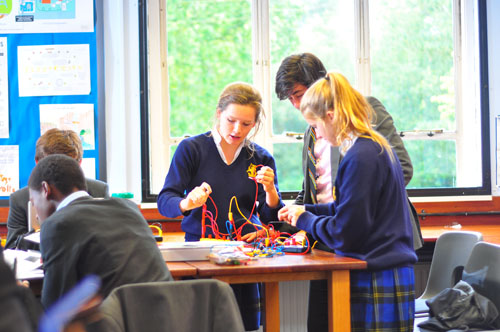
The recent bi-annual IB World Conference in Buenos Aires brought together heads of International Baccalaureate schools to discuss how technology is changing the way we think about teaching and learning. An innovative and provocative agenda engaged global educational leaders in discussions about the challenges faced with integrating technology into education. Charles Fadel, Fundador & Chairman of the Center for Curriculum Redesign, nos deslumbró con vanguardia invenciones robóticas destinadas a transformar aún más nuestro mundo. Esto me dejó preguntándome – cuánto tiempo hemos conseguido antes de las computadoras tienen el poder suficiente para superar la capacidad de pensar de todos los seres humanos en la tierra? Charles notes that “cuando se trata de los seres humanos vs. ordenadores enseñando a los niños, en el futuro inmediato, teachers are totally irreplaceable if they do their job right. Education requires personalized delivery at a high non-routine skill level, which is not going to be done by computers any time soon.” DR. Siva Kumari, whose appointment as the new IB Director General becomes effective on January 1, 2014, comments that “trends influencing the world in which we live and work are transforming the way students learn and the IB is uniquely positioned to support this transformation.” What do the heads of some of the world’s great IB schools think about the impact of technological advances? I chatted with Maria Barberis (Director de escuela, Colegio Carmen Arriola de Marín, Argentina), David Garner (Cabeza, International School of Indiana), Anthony Seldon (Dominar, universidad de Wellington, Inglaterra), and Kevin Skeoch (Cabeza, Dwight School Seúl) to get their perspectives.
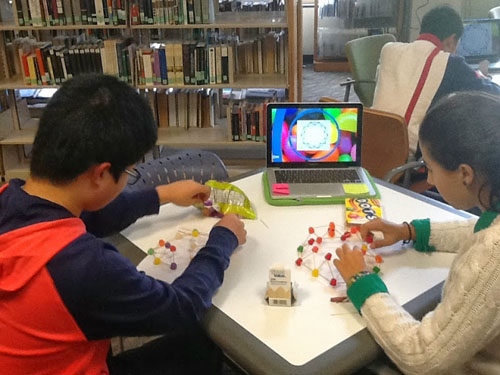
Research shows higher engagement and better retention when students use technology. How has technology impacted your classrooms? How do you predict your model will change five years from now?
David Garner: Ante todo, we should consider what “aprendizaje” es. Are we talking about a finite set of information that students need to memorize and retain? I’d suggest that’s an outdated concept, and using technology to support it may be an improvement on what went before, but is not a significant step forward.
We have instituted a one-to-one Apple laptop program for students in Grade 6 and above, with computer labs and iPads for younger students. This supports our aim to create an inquiry-based and student-centered learning environment. Inquiry-based approaches are closely aligned with constructivist theory – nosotros “create knowledge” as we research, explore and brainstorm, rather than memorize a set of knowledge that is presented to us. It’s more focused on developing skills for life long learning rather than merely content – critical skills of analysis, comparing, contrasting, hypothesizing, summarizing, y llegar a la comprensión de temas complejos. La tecnología permite a los estudiantes acceder a una amplia gama de fuentes auténticas de la información, se presenta en una variedad de medios. This is excellent for our more project-based work where we want students to research a central question. En general, the inquiry-based approach is more engaging. Technology can add to that significantly, y permiten el aprendizaje y el descubrimiento se lleven a cabo de forma independiente de la clase y del profesor.
We are committed to holistic education and this requires a high level of attention to socio-emotional matters. This is why I think that while technology will improve student engagement and ultimately the quality of learning, we still need schools to carry out their socio-emotional function.
Anthony Seldon: Things are changing so quickly now that even planning one year ahead seems almost self-defeating. Tenemos, sin embargo, made huge strides here in terms of creating a coherent digital strategy which harnesses the best ideas from leading practitioners in the field. Appointing a senior member of staff who is passionate about the transformative effect that technology can have on learning has also been key, but we are not starry-eyed about technology: some things can be done better using a book instead of an iPad. Google tools can promote collaborative learning but there is also no substitute for face-to-face teaching which emphasizes how essential human learning is. Así, I am a fan of technology, and we have put huge resources into making this a school which is very digitally literate, and I believe that our teaching has benefited because of this, but I would caution against seeing it as a panacea which can solve fundamental issues. A poor teacher doesn’t become an outstanding teacher simply because they know their way around an iPad.
María Barberis: Technology has clearly increased motivational standards to a great extent among teachers and students. It has brought knowledge access up to date, la mejora de los estudiantes’ presentations and making their learning process a multi-dimensional one. Actualmente, Moodle, video presentations planned and edited by students, blogs, interactive web-pages, wikis and others are being used. We believe that five years from now the main change will be in personal devices. We are now witnessing the increase in the use of tablets and smart phones. We plan to incorporate new technologies as they appear.
Kevin Skeoch: Seoul can boast the fastest Internet connection in the world and technology appears to be one of its greatest exports. Dicho esto, the technology in the taught curriculum is not always matching with technology in the real world. Technology is very much created by an educated class that has surpassed the critical mass of those responsible for supporting it. Technology is therefore best developed through students who use and manipulate it as I once did a typewriter or traditional library. For my students, the future cannot say no to the use of telephones, computers and technology in the classroom. We have to embrace this technology. Dwight school Seoul is a BYOD school for this reason in grades 6-12. Sin embargo, despite my wishes or dreams, the reality that technology is abused and misused by students remains our concern. The reality is that as much as we try to open the use of technology, it is teachers and schools that force it to close down for legal, parental, societal and even personal reasons.
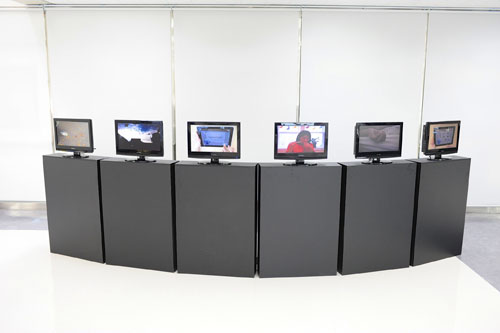
¿Cómo es el papel del maestro cambiando en la era digital? Will that role be different 5 año a partir de ahora?
Kevin Skeoch: Students are growing up in the digital age and teachers need to adapt and evolve both their teaching techniques and the content taught. Do students need to be able to do manual arithmetic when every device now has a built-in calculator app? Another example of this is spelling: with the evolution of spell checkers, do students need to be taught spelling anymore? The life skills that a modern student needs are very different to those needed 20 hace años que.
Anthony Seldon: The qualities that make a good teacher such a force for positive change will be the same in five years as it is now, and has always been. Technology is a help, but to some extent it should ‘melt away’ so that nothing comes between the student and the learning. The best lessons I’ve seen, in a tech-rich environment such as Wellington, are those where the technology has been used, but the excitement is all about learning, e ideas. A great lesson on Shakespeare, por ejemplo, in which the class have used Google Groups, or Docs, to work collaboratively, debería, I hope, get them excited about the genius of Shakespeare, rather than the tools they’re using.
David Garner: Moving from the ‘sage on the stage’ to the ‘guide on the side’. Teacher as facilitator of learning. The teachers need to be reasonably tech-savvy (many are not!).
Estados enteros en los EE.UU. han adoptado los libros de texto digitales. Las bibliotecas universitarias se están convirtiendo en los repositorios de contenidos digitales. What will your students’ textbooks look like 5 año a partir de ahora?
David Garner: We have not yet made the switch to digital textbooks. The IB inquiry-based and trans-disciplinary approach to learning encourages the teacher to create materials and students to conduct their own research rather than depend on “the textbook”, so textbooks are not as central to everyday learning as in schools with more traditional programs. (La paradoja aquí es que el uso de la tecnología digital para ofrecer un plan de estudios tradicional no es realmente un avance cualitativo en el aprendizaje.) Espero que los libros de texto digitales serán menos reconocibles como los libros de texto, sino más bien una manera de dirigir la atención a los conceptos o dudas específicas, y ayudar a los estudiantes a encontrar múltiples formas de abordar estas cuestiones.
Anthony Seldon: There is no doubt that they will be important in the future. To be able to study, decir, II Guerra Mundial, y tienen multimedia allí mismo, delante de ustedes, is tremendously exciting. Textbooks that allow students of different ability ranges to progress so that they can shape their own programmes, will be exciting, and possibly transformative, developments. Por supuesto, much of this comes with a caveat: how affordable will this be? iPads are still out of range for many schools and students, and a physical textbook is more durable, and more robust, than a tablet. Go into a chemistry laboratory with a group of 13 year olds and ask yourself: would I be happy having 30 iPads out here? Possibly not. Things will evolve, pero, much like Kindles and other ereaders, they will supplement textbooks, but probably not replace them.
María Barberis: Digital learning tools are used in about 20% of the cases in our school today. We believe that in five years all our textbooks might be digital, provided that necessary internal agreements are reached.
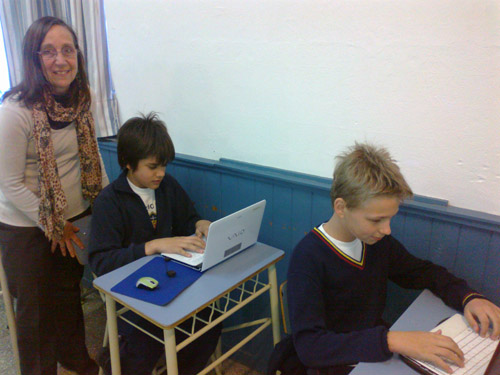
How has technology impacted the IB curriculum development in your school?
David Garner: Hardware (students and teachers with wireless MacBooks and iPads) and software allow for more variety in working and learning styles, and place vastly more resources at everyone’s fingertips. The curriculum can be more easily planned, grabado, reviewed and mapped – especially important when we are encouraging interdisciplinary projects. Technology seems to support positive collaborative work.
María Barberis: Technology has enhanced access to content and increased student interest and creativity.
Research shows tablets, teléfonos móviles, Internet sources and social media platforms continue to infiltrate classrooms in the US rapidly. To what extent are these tools used in your classrooms?
David Garner: Because we have a one-to-one laptop (manzana) política (Grado 6 upwards) and generally good provision of iPads and fixed computers for younger learners, we do not make great use of cell phones, although these are not banned and students may well use them as a more nimble alternative to the laptops on occasions. We are not making good, proactive use of social media, and this is an area we are looking at.
Schools need to get ahead of these media and lead the way. I don’t think age has anything to do with it. All social media use by students as part of their school program needs to be appropriately monitored.
Kevin Skeoch: We encourage students to use age appropriate devices in the classrooms, which include laptops, tablets and smartphones. Age appropriate devices for younger students would be tablets (iPads), and older students are required to bring laptops (BYOD policy). SNS are available for use in a monitored environment, however SNS are not permitted to be used during class time. Students are required to sign IT user contracts and are monitored for abuse of these services, por ejemplo. cyber bullying, accessing inappropriate material, juegos.
Anthony Seldon: Some teachers use all these more than others, and it isn’t only the younger members of staff doing this. Many of our middle leaders – Heads of Departments – are spreading good practice. Twitter is used by many students and staff as an essential learning tool. We worked with Facebook on a guide for teachers.
We are acutely aware of cyber bullying, via Facebook, and it is something we have to face all too often. We have to educate our young people to behave online responsibly, and this means that staff have to see that technology is liberating but, as we have seen recently, it is not without its hidden dangers. I believe we are at the beginning of a new age of intellectual enlightenment, y MOOC de son una manifestación muy alto perfil de este florecimiento de nuevas ideas, pero las escuelas son la primera línea de esta nueva era, y nos corresponde a todos educar a nuestros jóvenes sobre cómo pasar de ser nativos digitales a ciudadanos digitales, con toda la responsabilidad y rendición de cuentas que implica.
Para obtener más información sobre Charles Fadel: http://curriculumredesign.org/about/team/
universidad de Wellington: http://www.wellingtoncollege.org.uk/
International School of Indiana: http://www.isind.org/
Dwight School Seúl: http://www.dwight.or.kr/
Colegio Carmen Arriola de Marin: http://www.marin.esc.edu.ar/

Photos are courtesy of Wellington College, International School of Indiana, Dwight School Seoul and Colegio Carmen Arriola de Marin.
Para más artículos en el conseguidos de la tecnología? serie: La Búsqueda Global para la Educación: Got Tech? – Finlandia, La Búsqueda Global para la Educación: Got Tech? – Canada, La Búsqueda Global para la Educación: Got Tech? – Australia, La Búsqueda Global para la Educación: Got Tech? – Singapur, La Búsqueda Global para la Educación: Got Tech? – Estados Unidos, La Búsqueda Global para la Educación: Got Tech? – Argentina
En La Búsqueda Global para la Educación, unirse a mí y reconocidos a nivel mundial los líderes de opinión, incluyendo a Sir Michael Barber (Reino Unido), DR. Michael Bloquear (EE.UU.), DR. Leon Botstein (EE.UU.), Profesor Clay Christensen (EE.UU.), DR. Linda Darling-Hammond (EE.UU.), DR. Madhav Chavan (India), El profesor Michael Fullan (Canada), El profesor Howard Gardner (EE.UU.), El profesor Andy Hargreaves (EE.UU.), Profesor Yvonne Hellman (Países Bajos), Profesor Kristin Helstad (Noruega), Jean Hendrickson (EE.UU.), Profesor Rose Hipkins (Nueva Zelanda), Profesor Cornelia Hoogland (Canada), Honorable Jeff Johnson (Canada), Señora. Chantal Kaufmann (Bélgica), DR. Eija Kauppinen (Finlandia), Secretario de Estado Tapio Kosunen (Finlandia), Profesor Dominique Lafontaine (Bélgica), El profesor Hugh Lauder (Reino Unido), Profesor Ben Levin (Canada), Señor Ken Macdonald (Reino Unido), Profesor Barry McGaw (Australia), Shiv Nadar (India), Profesor R. Natarajan (India), DR. PAK NG (Singapur), DR. Denise Papa (Estados Unidos), Sridhar Rajagopalan (India), DR. Diane Ravitch (EE.UU.), Richard Wilson Riley (EE.UU.), Sir Ken Robinson (Reino Unido), Profesor Pasi Sahlberg (Finlandia), El profesor Manabu Sato (Japón), Andreas Schleicher (PISA, OCDE), DR. Anthony Seldon (Reino Unido), DR. David Shaffer (EE.UU.), DR. Kirsten Immersive Are (Noruega), Canciller Stephen Spahn (EE.UU.), Yves Theze (Lycee Francais EE.UU.), Profesor Charles Ungerleider (Canada), Profesor Tony Wagner (EE.UU.), Sir David Watson (Reino Unido), Profesor Dylan Wiliam (Reino Unido), DR. Marcos Wormald (Reino Unido), Profesor Theo Wubbels (Países Bajos), El profesor Michael Young (Reino Unido), y el profesor Zhang Minxuan (De China) a medida que exploran las cuestiones de educación cuadro grande que todas las naciones se enfrentan hoy. La Búsqueda Global para la Educación Comunitaria Página
C. M. Rubin es el autor de dos ampliamente leído serie en línea por la que recibió un 2011 Premio Upton Sinclair, “La Búsqueda Global para la Educación” y “¿Cómo vamos a Leer?” Ella es también el autor de tres libros más vendidos, Incluido The Real Alice in Wonderland.


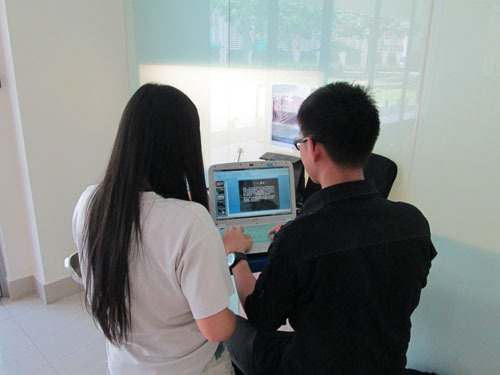
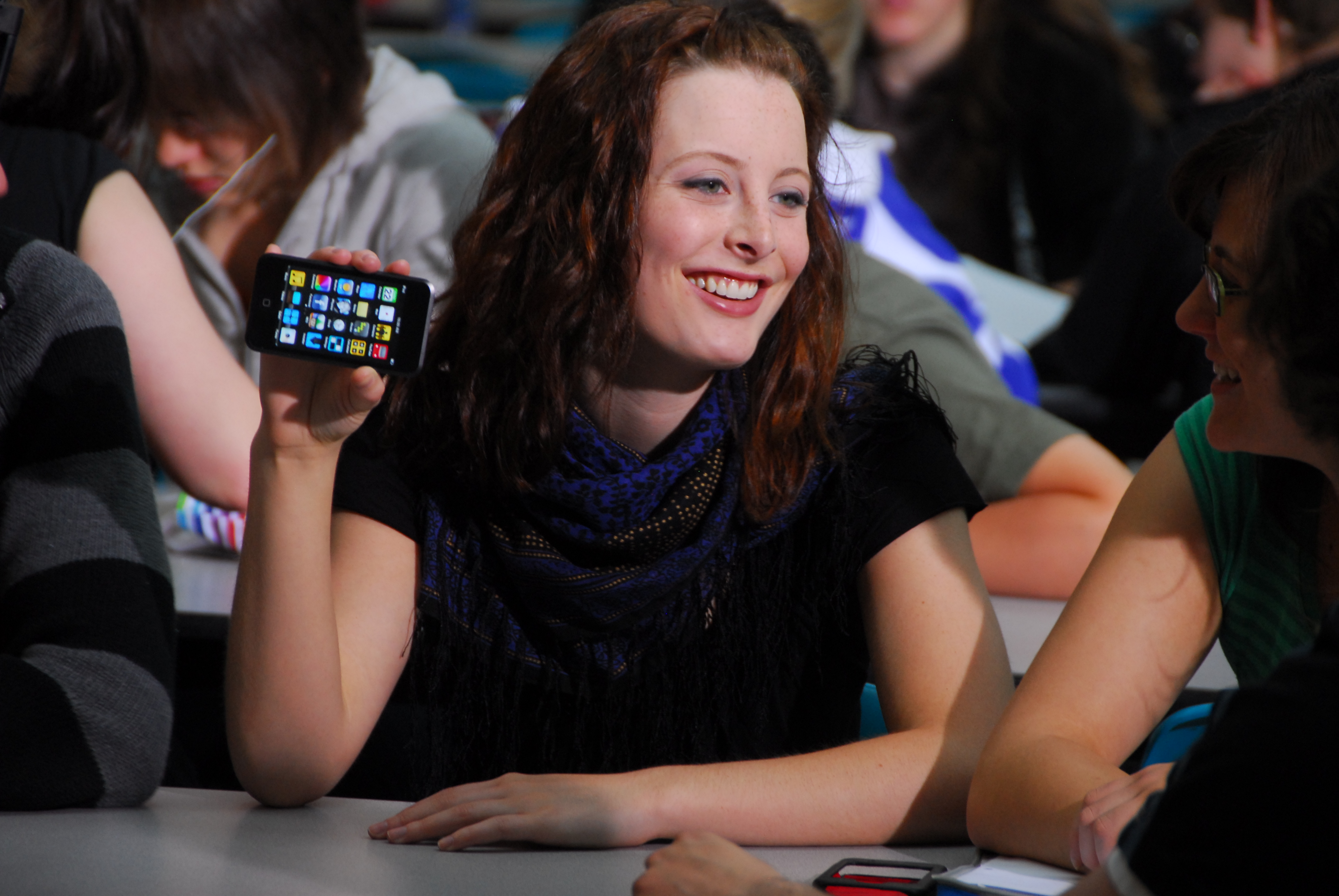
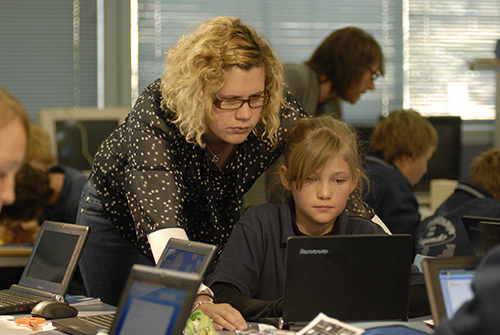
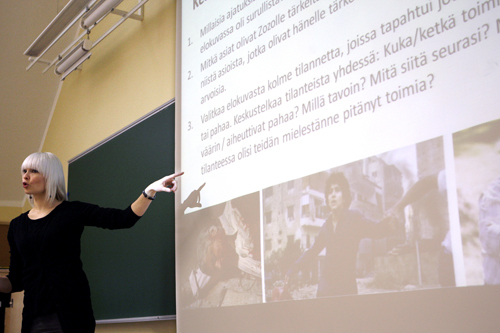
Comentarios recientes